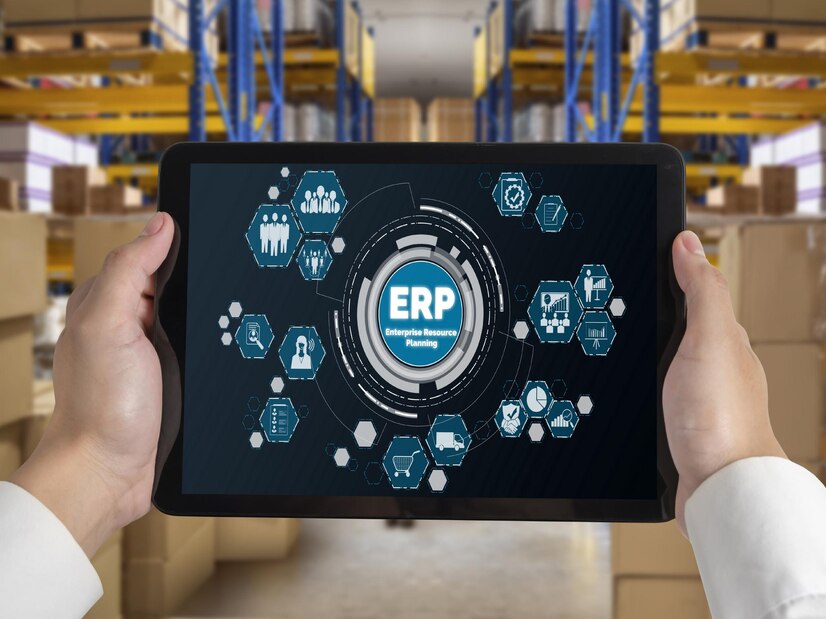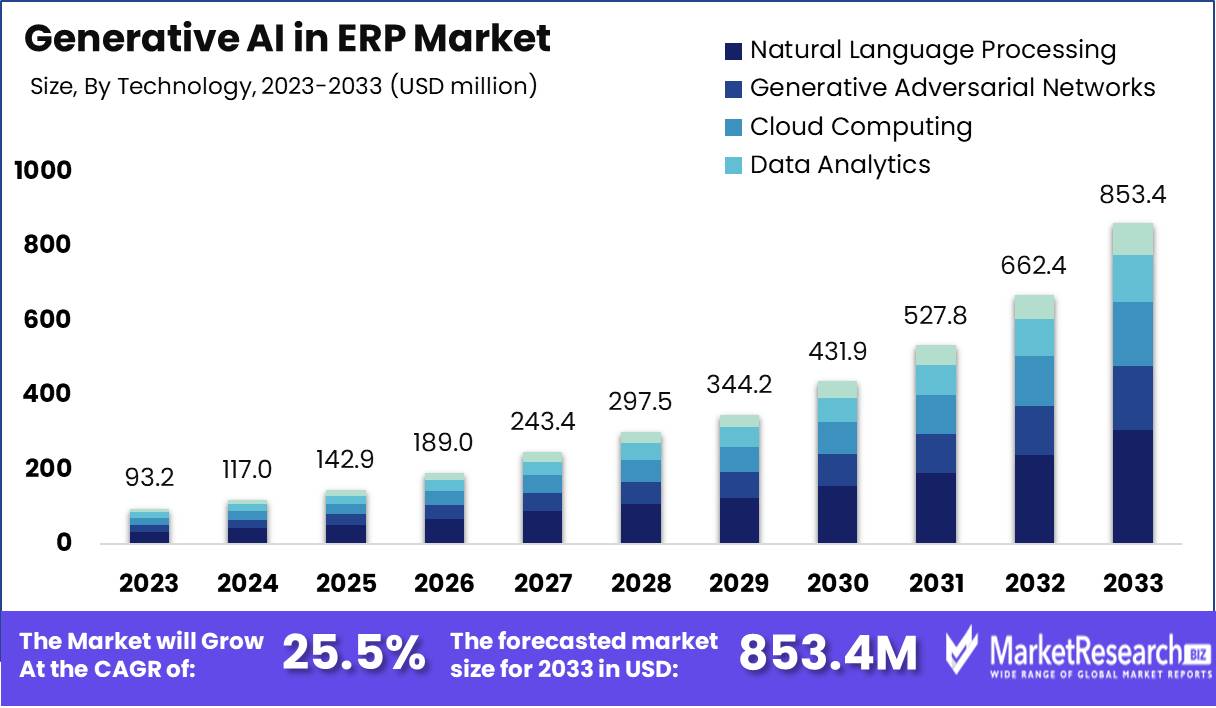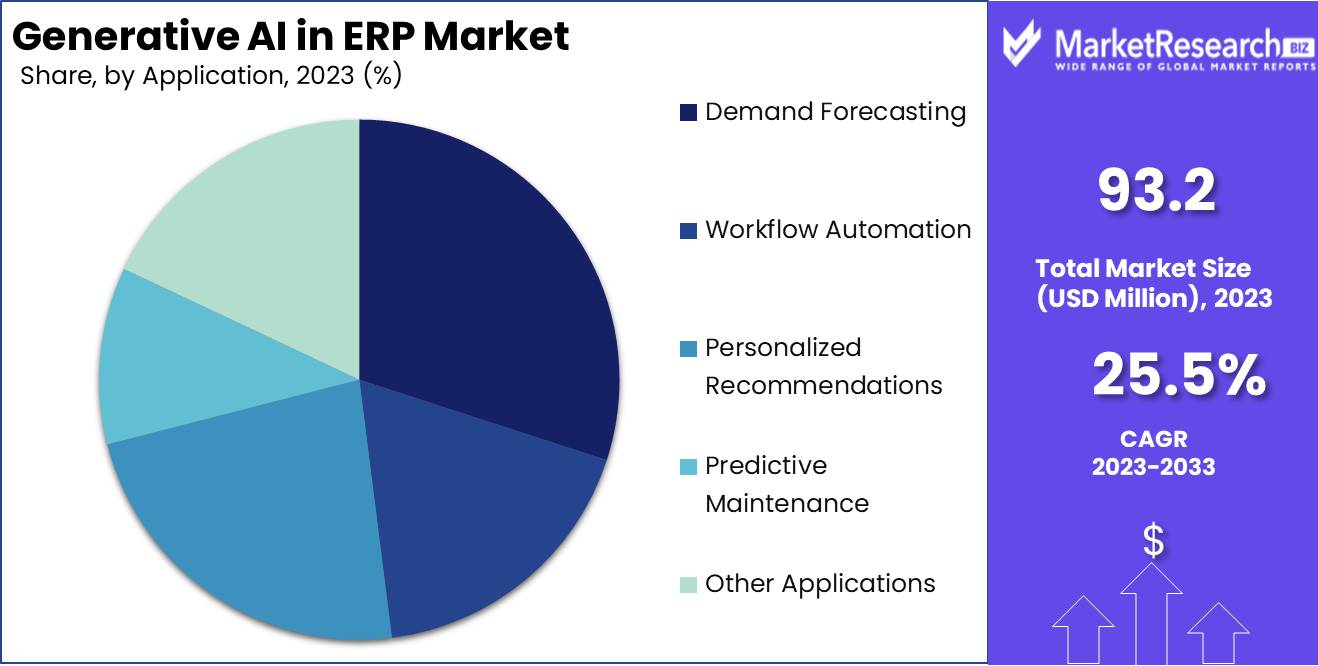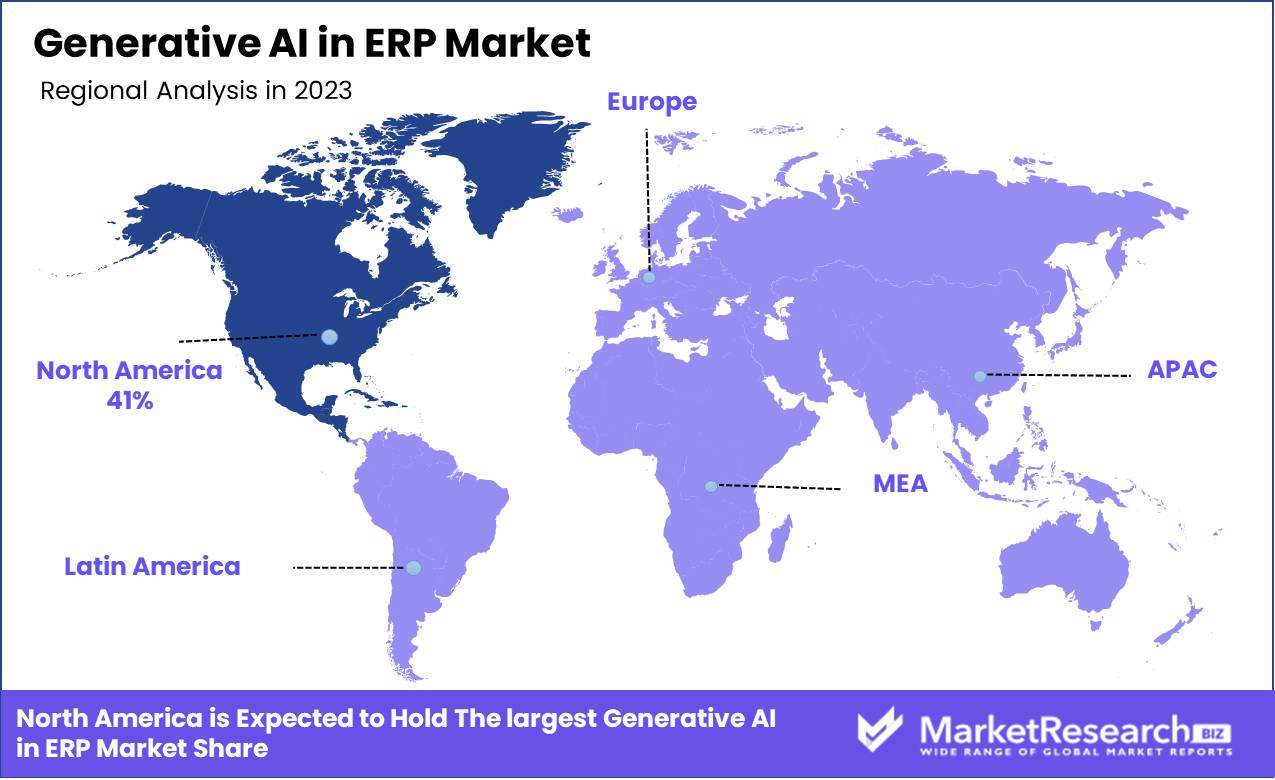
Generative AI in ERP Market by Technology (Natural Language Processing, Generative Adversarial Networks, and Others), By Application (Demand Forecasting, Workflow Automation, and Others), By End User (Manufacturing, E-commerce, Healthcare, Financial Services, and Others), By Region and Companies - Industry Segment Outlook, Market Assessment, Competition Scenario, Trends, and Forecast 2024-2033
-
38985
-
May 2024
-
300
-
-
This report was compiled by Vishwa Gaul Vishwa is an experienced market research and consulting professional with over 8 years of expertise in the ICT industry, contributing to over 700 reports across telecommunications, software, hardware, and digital solutions. Correspondence Team Lead- ICT Linkedin | Detailed Market research Methodology Our methodology involves a mix of primary research, including interviews with leading mental health experts, and secondary research from reputable medical journals and databases. View Detailed Methodology Page
-
Quick Navigation
Report Overview
The Generative AI in ERP Market size is expected to be worth around USD 853.4 Mn by 2033 from USD 93.2 Mn in 2023, growing at a CAGR of 25.5% during the forecast period from 2024 to 2033. The surge in demand for advanced technologies, rise in supply chain optimization and data augmentation are some of the main key driving factors for the generative AI in ERP.
Generative AI in ERP is defined as the integration of artificial intelligence methods, specifically for generative models in the ERP systems to enhance business techniques and decision-making. Such technologies comprise the generation of synthetic data, simulations, and forecasts to optimize different ERP functionalities that comprise inventory management, production planning, and monetary predictions. Generative artificial intelligence like generative adversarial networks and variational autoencoders can produce realistic situations for demand predictions, simulating the production methods and automating the data entry tasks. By implementing gen AI in ERP, businesses and firms can enhance precision in resource allocations, decrease operational inefficiencies, and improve overall business performance. Moreover, gen AI makes the creation of virtual surroundings for testing ERP configurations and tactics, minimizing implementation risks and expenses. This technology permits firms to make data-driven decisions, streamline operations, and productivity, and adapt rapidly to dynamic market conditions in their ERP systems.

A report published by Venture Beat in March 2024, highlights that Nominal is implementing gen AI to connect the gap between old, costly ERP systems and the financial management requirements of modern mid-market, multi-entity firms. The companies have launched with USD 9.2 million in seed funding from Bling Capital and Hyperwire ventures with participation from Vela Partners, incubate fund, and executives from Salesforce, Bill.com, Just Works, Intel, and service now. The current ERP landscape is subjugated by old technologies, costly system integrators, and lengthy personalization projects. A nominal survey of more than 120 financial experts has found that for every dollar spent on software licenses, an extra USD 3 is spent on system integrators.
The generative AI in ERP provides new advantages by automating difficult data entry tasks, improving forecasting analytics for inventory management, and enhancing resource allocations. It streamlines methods, enhances decision-making, and augments operational efficacy, ultimately leading to cost savings, enhanced productivity, and better business systems results. The demand for the gen AI in ERP will increase due to its requirement in the different verticals of the industries that will help in market expansion in the coming years.
Key Takeaways
- Market Growth: The Generative AI in ERP Market size is expected to be worth around USD 853.4 Mn by 2033 from USD 93.2 Mn in 2023, growing at a CAGR of 25.5% during the forecast period from 2024 to 2033.
- By Technology: In 2023, Generative Adversarial Networks (GANs) led Generative AI in ERP Market.
- By Application: Demand Forecasting dominates Generative AI in the ERP Market; workflow automation follows.
- By End-user: In 2023, Manufacturing led Generative AI in the ERP Market, followed by E-commerce.
- Regional Dominance: North America Dominates with 41% Market Share in Generative AI in the ERP market.
- Growth Opportunity: Generative AI in ERP is poised for exponential growth, driven by expanding market size and diversified applications.
Driving factors
Expanding Footprint: Rising Usage in Various Industries
The growth of Generative AI in the ERP (Enterprise Resource Planning) Market is substantially bolstered by its increasing adoption across diverse industries. As businesses recognize the transformative potential of Generative AI within ERP systems, its utilization spans sectors such as manufacturing, healthcare, finance, and retail, among others. This broadening application spectrum underscores the versatility and scalability of Generative AI solutions, catering to the unique needs and complexities of different industries.
Statistics from reputable market research indicate a significant surge in the integration of Generative AI within ERP frameworks across various sectors. For instance, recent studies reveal a notable uptick in Generative AI adoption rates across manufacturing enterprises, driven by the imperative for streamlined operations and enhanced productivity. Similarly, the healthcare industry is leveraging Generative AI in ERP systems to optimize patient care delivery, improve treatment outcomes, and manage complex healthcare data effectively.
Foundation of Trust: Data Quality and Accuracy
Anchoring the growth trajectory of Generative AI in the ERP Market is its unwavering commitment to data quality and accuracy. In an era defined by data-driven insights and predictive analytics, the reliability and precision of information are paramount. Generative AI within ERP systems serves as a catalyst for ensuring data integrity, consistency, and relevance, thereby fortifying organizational decision-making processes.
Robust statistics underscore the critical role of data quality in driving market demand for Generative AI in ERP solutions. Research findings reveal a direct correlation between data accuracy and organizational performance, with enterprises prioritizing investments in advanced AI capabilities to enhance data quality and governance. By leveraging Generative AI algorithms, businesses can cleanse, standardize, and enrich data sets, mitigating errors and inconsistencies while unlocking actionable insights.
Maximizing Efficiency: Optimized Resource Utilization
In the dynamic landscape of modern business landscape operations, the optimization of resources is paramount to maintaining a competitive edge. Generative AI in ERP systems emerges as a catalyst for maximizing efficiency and resource utilization, enabling enterprises to streamline processes, minimize wastage, and enhance productivity across diverse functional domains.
Quantifiable metrics highlight the transformative impact of optimized resource utilization facilitated by Generative AI within ERP frameworks. Studies demonstrate substantial improvements in operational efficiency and cost savings attributed to the implementation of AI-driven resource optimization strategies. By leveraging predictive analytics and machine learning algorithms, businesses can optimize inventory management, production scheduling, and workforce allocation, resulting in tangible bottom-line benefits.
Restraining Factors
Lack of Transparency: A Catalyst for Innovations and Solutions
Generative AI in the ERP market faces a significant challenge stemming from the lack of transparency within its operations. This lack of transparency often arises due to the complexity of algorithms and the opacity of decision-making processes. However, paradoxically, this very challenge fuels innovation and spurs the development of solutions within the market.
Transparency issues drive the demand for advanced Generative AI systems capable of providing clear insights into their decision-making processes. Companies seek solutions that not only optimize their ERP systems but also offer transparency and explainability. As a result, market players are compelled to invest in research and development efforts aimed at enhancing the transparency of their Generative AI technologies.
Data Bias and Inaccuracy: Propelling Demand for Enhanced Accuracy and Precision
Data bias and inaccuracy represent significant challenges in the Generative AI in the ERP market, hindering the effectiveness and reliability of AI-driven solutions. Biased data sets and inaccuracies in data collection can lead to erroneous insights and flawed decision-making processes, posing a considerable risk to businesses.
However, in response to these challenges, market dynamics are fostering a growing demand for enhanced accuracy and precision in Generative AI systems. Organizations recognize the critical importance of reliable data in driving informed decision-making within their ERP environments. Consequently, market players are increasingly investing in technologies that mitigate data bias and ensure the accuracy of AI-generated insights.
Synergistic Impact: Cultivating Trust and Market Expansion
While each primary restraining factor presents its unique set of challenges to the Generative AI in the ERP market, their combined impact synergistically catalyzes market growth. The pursuit of transparency and accuracy within AI-driven ERP systems not only addresses individual challenges but also cultivates trust and reliability among stakeholders.
As organizations witness the transformative potential of transparent and unbiased Generative AI technologies, confidence in these solutions grows, leading to broader market adoption and expansion. Moreover, the concerted efforts of market players to innovate and overcome these restraining factors foster a conducive environment for sustained market growth and development.
By Technology Analysis
In 2023, Generative Adversarial Networks (GANs) led Generative AI in ERP with a 40% share.
In 2023, Generative Adversarial Networks (GANs) held a dominant market position in the Based on Technology segment of Generative AI in the ERP market. This technology segment continues to thrive due to its pivotal role in generating synthetic data that closely resembles real data, thus facilitating robust training of machine learning models within enterprise resource planning (ERP) systems.
Natural Language Processing (NLP) emerges as another key contender, leveraging linguistic algorithms to interpret and generate human language data, enhancing ERP functionalities such as chatbots, sentiment analysis, and document processing. Cloud Computing stands as a foundational pillar, offering scalable infrastructure and enabling seamless integration of ERP systems with other organizational platforms. Data Analytics remains indispensable, empowering ERP users with actionable insights derived from vast datasets, and driving informed decision-making processes. Beyond these, various Other Technologies contribute to the ecosystem, ranging from blockchain for secure transactions to IoT for real-time monitoring. Collectively, these segments underscore the dynamic landscape of Generative AI within ERP, reflecting ongoing innovation and adaptation to evolving market demands.
By Application Analysis
Demand Forecasting dominates Generative AI in the ERP Market; workflow automation follows.
In 2023, Demand Forecasting held a dominant market position in the segment of Generative AI in the ERP Market, based on application. Demand forecasting plays a pivotal role in modern business outcomes operations, offering companies valuable insights into future market trends and consumer behavior. Leveraging advanced algorithms and data analytics, demand forecasting systems enable organizations to optimize inventory management, streamline production processes, and enhance overall supply chain efficiency. This segment's dominance underscores the growing significance of predictive analytics in driving strategic decision-making across industries.
Additionally, Workflow Automation emerged as another key application within the Generative AI in the ERP Market landscape. By automating repetitive tasks and standardizing workflows, organizations can significantly improve operational efficiency, reduce human error, and allocate resources more effectively. The adoption of workflow automation solutions is fueled by the ongoing digital transformation efforts aimed at achieving greater agility and competitiveness in the market.
Moreover, Personalized Recommendations garnered notable attention within the Generative AI in ERP Market, offering tailored product suggestions and content recommendations to end-users. This application capitalizes on machine learning algorithms to analyze user preferences, behavior patterns, and historical data, thereby enhancing customer engagement and satisfaction, and ultimately, driving sales revenue. As business functions increasingly prioritize customer-centric strategies, personalized recommendations are poised to play a pivotal role in shaping the future of marketing and e-commerce.

By End-user Analysis
In 2023, Manufacturing led Generative AI in the ERP Market, followed by E-commerce.
In 2023, Manufacturing held a dominant market position in the Generative AI in the ERP Market, based on end-users. Manufacturing entities harnessed the power of Generative AI within Enterprise Resource Planning (ERP) systems to streamline operations, enhance productivity, and optimize resource allocation. With the integration of Generative AI technologies, manufacturers could anticipate demand fluctuations, optimize production schedules, and mitigate supply chain disruptions efficiently. This strategic adoption empowered manufacturing stakeholders to adapt swiftly to market dynamics, thereby maintaining a competitive edge in the industry landscape.
E-commerce emerged as another significant segment leveraging Generative AI within ERP systems. E-commerce platforms capitalized on Generative AI algorithms to personalize customer experiences, optimize product recommendations, and streamline inventory management processes. By harnessing the capabilities of Generative AI, e-commerce enterprises enhanced customer satisfaction, fostered brand loyalty, and maximized revenue generation opportunities.
Healthcare, Financial Services, and Other End Users also demonstrated notable traction in adopting Generative AI within ERP frameworks, albeit to varying degrees. Healthcare institutions utilize Generative AI-powered ERP systems to enhance patient care delivery, optimize resource allocation, and improve operational efficiencies. Financial services entities leveraged Generative AI to streamline regulatory compliance, enhance risk management practices, and deliver personalized financial services to clients.
Key Market Segments
Based on Technology
- Natural Language Processing
- Generative Adversarial Networks
- Cloud Computing
- Data Analytics
- Other Technologies
Based on Application
- Demand Forecasting
- Workflow Automation
- Personalized Recommendations
- Predictive Maintenance
- Other Applications
Based on the End User
- Manufacturing
- E-commerce
- Healthcare
- Financial Services
- Other End Users
Growth Opportunity
Market Size Expansion: Seizing the Potential
The Generative AI in the ERP market stands at the cusp of exponential growth, propelled by a convergence of technological advancements and escalating demand for streamlined enterprise solutions. Market size expansion remains a primary growth driver, with forecasts indicating a robust trajectory.
According to recent data, the global Generative AI in ERP market is poised to expand significantly, surpassing previous estimates. This surge can be attributed to burgeoning adoption rates across diverse industry verticals, fueled by the imperative need for agile, data-driven decision-making frameworks. As business activities increasingly recognize the transformative potential of AI-infused ERP systems, investments in advanced solutions are set to escalate, further amplifying market dynamics.
Application Diversification: Unlocking Multifaceted Opportunities
In tandem with market size expansion, application diversification emerges as a pivotal avenue for unlocking multifaceted opportunities within the Generative AI in the ERP landscape. Traditional ERP functionalities are being augmented with generative AI capabilities, fostering innovation and efficiency across a spectrum of applications.
From supply chain optimization to predictive analytics and beyond, generative AI is revolutionizing how enterprises operate and strategize. As organizations pivot towards holistic digital transformation initiatives, the demand for tailored generative AI solutions is poised to soar, presenting vendors with a vast canvas of untapped potential. With applications spanning from intelligent automation to predictive maintenance, the paradigm shift towards AI-driven ERP ecosystems underscores a transformative era of unparalleled growth and innovation.
Latest Trends
Automated Content Generation: Revolutionizing Data Handling
Automated Content Generation is reshaping how ERP systems handle data. By leveraging Generative AI algorithms, ERP platforms can autonomously generate reports, insights, and analyses. This trend streamlines decision-making processes, enabling organizations to extract actionable intelligence from vast datasets effortlessly. As E-Commerce businesses seek real-time insights, Automated Content Generation empowers ERP systems to deliver timely and accurate information, enhancing operational efficiency and strategic decision-making.
Intelligent Process Automation: Enhancing Operational Agility
Intelligent Process Automation (IPA) represents a paradigm shift in ERP functionalities. By integrating Generative AI capabilities, ERP solutions can automate repetitive tasks, optimize workflows, and anticipate user needs. This trend fosters operational agility by reducing manual intervention, minimizing errors, and accelerating task completion. With Intelligent Process Automation, organizations can streamline complex business processes, improve resource allocation, and enhance overall productivity. Moreover, IPA augments ERP systems with adaptive learning mechanisms, enabling continuous optimization and responsiveness to evolving E-Commerce business dynamics.
Regional Analysis
North America Dominates with 41% Market Share in Generative AI in the ERP market.
In the Generative AI in the ERP market, North America stands as a dominant force, capturing a significant share of approximately 41% in the global landscape. This region is characterized by a mature technological infrastructure and a robust adoption of AI solutions across various industries, including manufacturing, healthcare, and finance. With key players continually investing in research and development, North America remains at the forefront of innovation in the ERP space, driving the demand for generative AI solutions.

Europe follows closely, displaying a steady growth trajectory driven by the increasing adoption of digital transformation initiatives across enterprises. The region benefits from favorable government policies supporting AI innovation and a strong presence of established ERP vendors. As a result, Europe holds a substantial market share, bolstered by countries like Germany, the UK, and France.
In Asia Pacific, rapid industrialization coupled with the adoption of advanced technologies fuels the demand for generative AI in ERP systems. Emerging economies such as China, India, and Japan lead the market expansion, supported by a burgeoning startup ecosystem and a growing emphasis on enhancing operational efficiency.
The Middle East & Africa and Latin America regions exhibit promising growth potential, albeit at a slower pace compared to other regions. Factors such as increasing digitalization initiatives and the adoption of cloud-based solutions contribute to market development. However, challenges related to infrastructure and awareness hinder the market's full potential in these regions.
Key Regions and Countries
North America
- The US
- Canada
- Rest of North America
Europe
- Germany
- France
- The UK
- Spain
- Netherlands
- Russia
- Italy
- Rest of Europe
Asia-Pacific
- China
- Japan
- Singapore
- Thailand
- South Korea
- Vietnam
- India
- New Zealand
- Rest of Asia Pacific
Latin America
- Mexico
- Brazil
- Rest of Latin America
Middle East & Africa
- Saudi Arabia
- South Africa
- UAE
- Rest of the Middle East & Africa
Key Players Analysis
In the global Generative AI in ERP (Enterprise Resource Planning) market landscape of 2024, key players such as SAP, Oracle, Microsoft, Infor, Epicor, and other market contenders have emerged as influential forces shaping the industry's trajectory. These companies hold significant sway over the market dynamics owing to their robust technological infrastructure, expansive customer base, and extensive research and development capabilities. Leveraging generative AI, these key players are revolutionizing traditional ERP systems by infusing them with advanced capabilities such as predictive analytics, natural language processing, and automated decision-making, thereby enhancing operational efficiency, decision-making agility, and customer satisfaction across diverse industries.
SAP, Oracle, and Microsoft, as stalwarts in the ERP domain, are at the forefront of integrating generative AI technologies into their platforms, enabling businesses to harness the power of data-driven insights and automation. In addition to these industry giants, companies like Infor and Epicor are rapidly expanding their footprint in the market, offering innovative AI-powered ERP solutions tailored to the specific needs of various sectors.
Moreover, the presence of other emerging market players injects further dynamism into the landscape, fostering competition and innovation. As businesses increasingly recognize the transformative potential of generative AI in ERP systems, these key players are poised to play a pivotal role in driving the market forward, fueling growth, and ushering in a new era of intelligent enterprise management.
Market Key Players
- SAP
- Oracle
- Microsoft
- Infor
- Epicor
- Other Market Players
Recent Development
- In March 2024, Bling Capital and Hyperwise Ventures-backed Nominal disrupts the $44B ERP market with generative AI, offering an innovative platform for mid-market businesses' financial management needs.
- In March 2024, Nominal, utilizing generative AI, disrupts the ERP market with $9.2M seed funding, targeting mid-market multi-entity businesses, aiming to modernize financial management.
- In March 2024, Emirates Steel Arkan, UAE-based manufacturer of steel and building materials, partners with SAP SE to implement RISE with SAP for streamlined operations, a resilient supply chain, and automatic upgrades to new technologies, enhancing sustainability and agility.
Report Scope
Report Features Description Market Value (2023) USD 93.2 Million Forecast Revenue (2033) USD 853.4 Million CAGR (2024-2032) 25.5% Base Year for Estimation 2023 Historic Period 2016-2023 Forecast Period 2024-2033 Report Coverage Revenue Forecast, Market Dynamics, COVID-19 Impact, Competitive Landscape, Recent Developments Segments Covered By Technology (Natural Language Processing, Generative Adversarial Networks, Cloud Computing, Data Analytics, and Other Technologies), By Application (Demand Forecasting, Workflow Automation, Personalized Recommendations, Predictive Maintenance, and Other Applications), By End User (Manufacturing, E-commerce, Healthcare, Financial Services, and Other End Users) Regional Analysis North America - The US, Canada, Rest of North America, Europe - Germany, France, The UK, Spain, Italy, Russia, Netherlands, Rest of Europe, Asia-Pacific - China, Japan, South Korea, India, New Zealand, Singapore, Thailand, Vietnam, Rest of Asia Pacific, Latin America - Brazil, Mexico, Rest of Latin America, Middle East & Africa - South Africa, Saudi Arabia, UAE, Rest of Middle East & Africa Competitive Landscape SAP, Oracle, Microsoft, Infor, Epicor, and Other Market Players Customization Scope Customization for segments, region/country-level will be provided. Moreover, additional customization can be done based on the requirements. Purchase Options We have three licenses to opt for Single User License, Multi-User License (Up to 5 Users), Corporate Use License (Unlimited User and Printable PDF) -
-
- SAP
- Oracle
- Microsoft
- Infor
- Epicor
- Other Market Players




